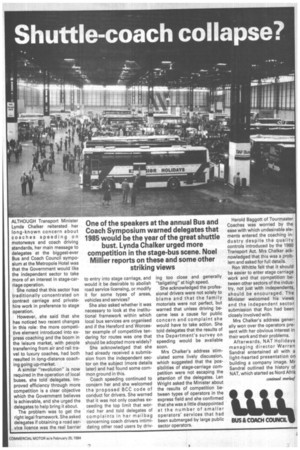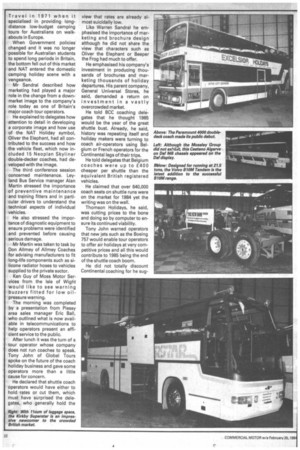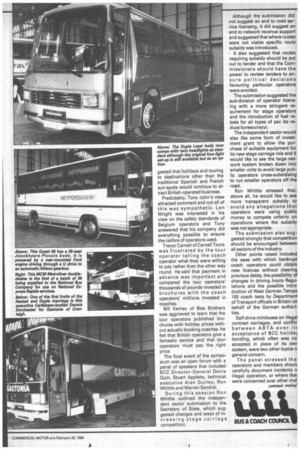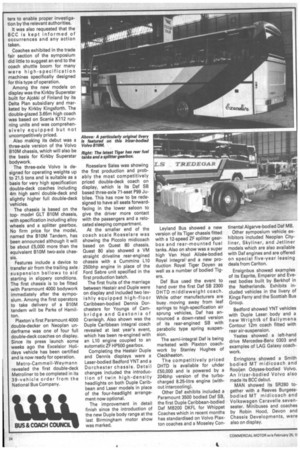ALTHOUGH Transport Minister Lynda Chalker reiterated her long-known concern about
Page 23

Page 24

Page 25

Page 26

If you've noticed an error in this article please click here to report it so we can fix it.
coaches speeding on motorways and coach driving standards, her main message to delegates at the biggest-ever Bus and Coach Council symposium at the Metropole Hotel was that the Government would like the independent sector to take more of an interest in stage-carriage operation.
She noted that this sector has traditionally concentrated on contract carriage and privatehire work in preference to stage operation.
However, she said that she has noticed two recent changes in this role: the more competitive element introduced into express coaching and the boom in the leisure market, with people transferring from air and rail travel to luxury coaches, had both resulted in long-distance coaching going up-market.
A similar "revolution" is now required in the operation of local buses, she told delegates. Improved efficiency through more competition is a clear objective which the Government believes is achievable, and she urged the delegates to help bring it about.
The problem was to get the right legal framework. She asked delegates if obtaining a road service licence was the real barrier to entry into stage carriage, and would it be desirable to abolish road service licensing, or modify it for some types of areas, vehicles and services?
She also asked whether it was necessary to look at the institutional framework within which local bus services are organised and if the Hereford and Worcester example of competitive tendering for routes was one that should be adopted more widely?
She acknowledged that she had already received a submission from the independent sector on the subject (more details later) and had found some common ground in this.
Coach speeding continued to concern her and she welcomed the proposed BCC code of conduct for drivers. She warned that it was not only coaches exceeding the top limit that worried her and told delegates of complaints in her mailbag concerning coach drivers intimidating other road users by driv ing too close and generally "tailgating" at high speed.
She acknowledged the professional drivers were not solely to blame and that the family motorists were not perfect, but warned that unless driving became less a cause for public concern and complaint she would have to take action. She told delegates that the results of the Department's survey on speeding would be available soon.
Mrs Chalker's address stimulated some lively discussion, which suggested that the possibilities of stage-carriage competition were not escaping the attention of the delegates. Len Wright asked the Minister about the results of competition between types of operators in the express field and she confirmed that she was a little disappointed at the number of smaller operators' services that had been submerged by large public sector operators. Harold Baggott of Tourmaster Coaches was worried by the ease with which undesirable elements entered the coaching industry despite the quality controls introduced by the 1980 Transport Act. Mrs Chalker acknowledged that this was a problem and asked for full details.
Ron Whittle felt that it should be easier to enter stage carriage work and that competition between other sectors of the industry, not just with independents, should be encouraged. The Minister welcomed his views and the independent sector submission that Ron had been closely involved with.
Mrs Chalker's address generally won over the operators present with her obvious interest in their work and their problems.
Afterwards, NAT Holidays managing director Warren Sandrai entertained all with a light-hearted presentation on building a company image. Mr Sandral outlined the history of NAT, which started as Nord Afrik Travel in 1971 when it specialised in providing longdistance low-budget camping tours for Australians on walkabouts in Europe.
When Government policies changed and it was no longer possible for Australian students to spend long periods in Britain, the bottom fell out of this market and NAT entered the domestic camping holiday scene with a vengeance.
Mr Sandral described how marketing had played a major role in the change from a downmarket image to the company's role today as one of Britain's major coach tour operators.
He explained to delegates how attention to detail in developing a corporate image and how use of the NAT Holiday symbol, Oliver the Elephant, had all contributed to the success and how the vehicle fleet, which now included 15 Neoplan Skyliner double-decker coaches, had developed with the image.
The third conference session concerned maintenance. Leyland Bus Service manager Alan Martin stressed the importance of preventive maintenance and training fitters and in particular drivers to understand the technical aspects of individual vehicles.
He also stressed the importance of diagnostic equipment to ensure problems were identified and prevented before causing serious damage.
Mr Martin was taken to task by Don Allrney of Allmey Coaches for advising manufacturers to fit long-life components such as silicone radiator hoses to vehicles supplied to the private sector.
Ken Guy of Moss Motor Services from the Isle of Wight would like to see warning buzzers fitted for low oilpressure warning.
The morning was completed by a presentation from Plessy area sales manager Eric Ball, who outlined what is now available in telecommunications to help operators present an efficient service to the public.
After lunch it was the turn of a tour operator whose company does not run coaches to speak. Tony John of Global Tours spoke on the future of the coach holiday business and gave some operators more than a little cause for concern.
He declared that shuttle coach operators would have either to hold rates or cut them, which must have surprised the delegates, who generally hold the view that rates are already almost suicidally low.
Like Warren Sandral he emphasised the importance of marketing and brochure design although he did not share the view that characters such as Oliver the Elephant or Beeper the Frog had much to offer.
He emphasised his company's investment in producing thousands of brochures and marketing thousands of holiday departures. His parent company, General Universal Stores, he said, demanded a return on investment in a vastly overcrowded market.
He told BCC coaching delegates that he thought 1985 would be the year of the great shuttle bust. Already, he said, history was repeating itself and holiday makers were turning to coach air-operators using Belgium or French operators for the Continental legs of their trips.
He told delegates that Belgium coaches were up to E400 cheaper per shuttle than the equivalent British registered vehicles.
He claimed that over 640,000 coach seats on shuttle runs were on the market for 1984 yet the writing was on the wall.
Thomson Holidays, he said, was cutting prices to the bone and doing so by computer to ensure its continued viability.
Tony John warned operators that new jets such as the Boeing 757 would enable tour operators to offer air holidays at very competitive prices and all this would contribute to 1985 being the end of the shuttle coach boom.
He did not totally discount Continental coaching for he sug gested that holidays and touring to destinations other than the traditional Spanish and French sun-spots would continue to attract British-operated business.
Predictably, Tony John's view attracted comment and not all of this was sympathetic. Len Wright was interested in his view on the safety standards of Belgium operators and Tony answered that his company did everything possible to ensure the calibre of operators used.
Trevor Carnell of Carnell Tours was frustrated by the tour operator telling the coach operator what they were willing to pay rather than the other way round. He said that payment in advance was important and compared the tour operators' thousands of pounds invested in brochures with the coach operators' millions invested in coaches.
Bill Varney of Biss Brothers was aggrieved to learn that the tour operators published brochures with holiday prices without actually booking coaches. He felt that British operators give a fantastic service and that tour operators must pay the right price.
The final event of the symposium was an open forum with a panel of speakers that included BCC Director-General Denis Quin, Stuart Appleby, technical executive Alan Gurley, Ron Whittle and Warren Sandral, During this session Ron Whittle outlined the independent sector submission to the Secretary of State, which suggested changes and ways of increasing stage carriage competition. Although the submission did not suggest an end to road service licensing, it did suggest an end to network revenue support and suggested that where routes were not viable specific route subsidy was introduced.
It also suggested that routes requiring subsidy should be put out to tender and that the Commissioners should have the power to review tenders to ensure political decisions favouring particular operators were avoided.
The submission suggested the sub-division of operator licensing with a more stringent requirement for stage operators and the introduction of fuel rebate for all types of psv (to reduce bureaucracy).
The independent sector would also like some form of investment grant to allow the purchase of suitable equipment for its new stage carriage role and it would like to see the large network system broken down into smaller units to avoid large public operators cross-subsidising to run smaller operators off the road.
Ron Whittle stressed that, above all, he would like to see more transparent subsidy to avoid any allegations that operators were using public money to compete unfairly on operations where the subsidy was not appropriate.
The submission also suggested strongly that competition should be encouraged between all sectors of the industry.
Other points raised included the ease with which bankrupt coach operators could obtain new licences without clearing previous debts, the possibility of changes in driving hours Regulations and the possible introduction of West German Tempo 100 coach tests by Department of Transport officals in Britain on behalf of the German authorities.
Self-drive minibuses on illegal contract carriages, and conflict between ABTA over it acceptance of BCC holida) bonding, which often was no accepted in place of its owr system, were two other topics general concern.
The panel stressed tha. operators and members shoulc carefully document incidents o. illegal operation, or where they were concerned over other mat
ters to enable proper investigation by the relevant authorities.
It was also requested that the BCC is kept informed of occurrences and any action taken.
Coaches exhibited in the trade fair section of the symposium did little to suggest an end to the coach shuttle boom for many were high-specification machines specifically designed for this type of operation.
Among the new models on display was the Kirkby Superstar built for Ajokki of Finland by its Delta Plan subsidiary and marketed by Kirkby Kingsforth. The double-glazed 3.65m high coach was based on Scania K112 running units and was comprehensively equipped but not uncompetitively priced.
Also making its debut was a three-axle version of the Volvo B1OM chassis, which will also be the basis for Kirkby Superstar bodywork.
The three-axle Volvo is designed for operating weights up to 21.5 tons and is suitable as a basis for very high specification double-deck coaches including 4m high semi double-deck and slightly higher full double-deck vehicles.
The chassis is based on the topmodel GLT B1OM chassis, with specification including alloy wheels and a splitter gearbox. No firm price for the model, named the B1OM Tandem, has been announced although it will be about £5,000 more than the equivalent B1OM two-axle chassis.
Features include a device to transfer air from the trailing axle suspension bellows to aid starting in slippery conditions. The first chassis is to be fitted with Paramount 4000 bodywork immediately after the symposium. Among the first operators to take delivery of a B10M tandem will be Parks of Hamilton.
Plaxton's first Paramount 4000 double-decker on Neoplan underframe was one of four full double-deck coaches on display. Since its press launch some weeks ago the Excelsior Holidays vehicle has been certified and is now ready for operation.
Metro-Cammell-Weymann revealed the first double-deck Metroliner to be completed in its 3 9-vehicle order from the National Bus Company. Roeselare Sales was showing the first production and probably the most competitively priced double-deck coach on display, which is its Daf SB based three-axle 71-seat P99 Jubilee. This has now to be redesigned to have all seats forwardfacing in the lower saloon to give the driver more contact with the passengers and a relocated sleeping compartment.
At the smaller end of the coach scale Roeselare was showing the Piccolo midicoach based on Quest 80 chassis. Quest 80 also showed a VM straight driveline rear-engined chassis with a Cummins L10 250bhp engine in place of the Ford Sabre unit specified in the first production batch.
The first fruits of the marriage between Hestair and Duple were on display and included two lavishly equipped high-floor Caribbean-bodied Dennis Dorchesters for Youngs of Cambridge and Gastonia of Cranleigh. Also shown was the Duple Caribbean integral coach revealed at last year's event, which has been re-engined with an L10 engine coupled to an automatic ZF HP500 gearbox.
Completing the Hestair Duple and Dennis displays were a Laser-bodied Bedford YNT and a Dorchester chassis. Detail changes included the introduction of twin high-density headlights on both Duple Caribbean and Laser models in place of the four-headlight arrangement now optional.
The improvement in detail finish since the introduction of the new Duple body range at the last Birmingham motor show was marked. Leyland Bus showed a new version of its Tiger chassis fitted with a 12-speed ZF splitter gearbox and rear-mounted fuel tanks. Also on show was a super high Van Hool Alizee-bodied Royal integral and a new production Royal Tiger Doyen as well as a number of bodied TigerS.
Daf Bus used the event to hand over the first Daf SB 2300 DHTD middleweight coach. While other manufacturers are busy moving away from leaf springs to high-specification air sprung vehicles, Daf has announced a down-rated version of its rear-engined SB with parabolic type spring suspension.
The semi-integral Daf is being marketed with Plaxton coachwork by Stanley Hughes of Cleckheaton.
The competitively priced DHTD is available for under £50,000 and is powered by a 204bhp version of the turbocharged 8.25-litre engine (without intercooling).
Other Daf exhibits included a Paramount 3500 bodied Daf SB, the first Duple Caribbean-bodied Daf MB200 DKFL for Whippet Coaches which in recent months has standardised on Volvo Plaxton coaches and a Moseley Con tinental Algarve-bodied Daf MB.
Other symposium vehicle exhibitors included Neoplan Cityliner, Skyliner, and Jetliner models which are also available with Daf engines and are offered on special five-year leasing deals from Carlton.
Ensignbus showed examples of its Esprite, Emperor and Everest bodies built by Berkhof in the Netherlands. Exhibits included vehicles in the livery of Kings Ferry and the Scottish Bus Group.
Bedford showed YNT vehicles with Duple Laser body and a new Wright t of Ballymena Contour 12m coach fitted with rear air-suspension.
Yeates showed a left-hand drive Mercedes-Benz 0303 and examples of LAG Galaxy coachwork.
Erringtons showed a Smith bodied MT midicoach and Rooijen Odysee-bodied Volvo. An Irizar-bodied Volvo also made its BCC debut.
MAN showed its SR280 together with a Reeves Burgessbodied MT midicoach and Volkswagen Caravelle sevenseater. Minibuses and coaches by Robin Hood, Devon and Chassis Developments, were also on display.
































































































